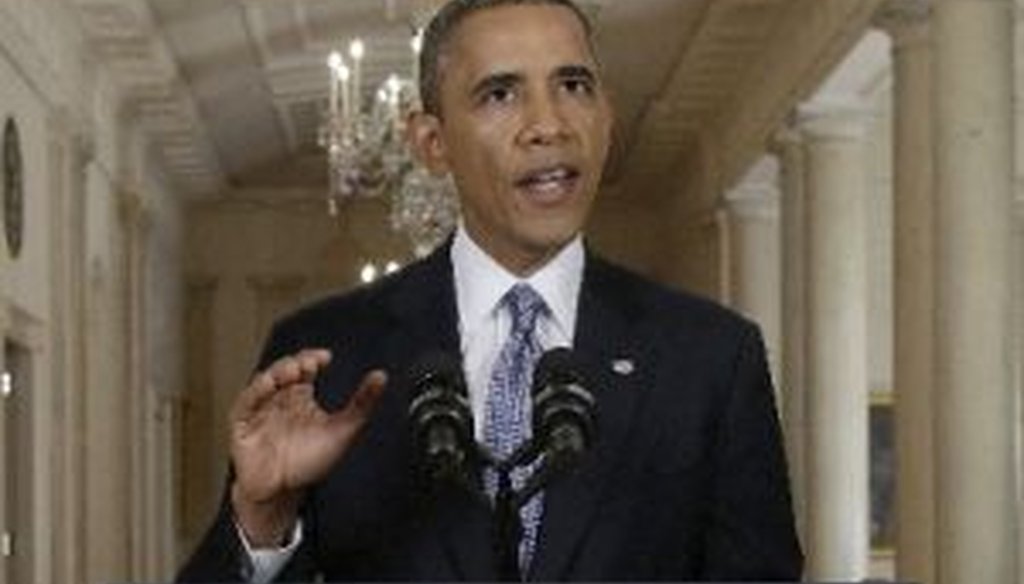

Our only agenda is to publish the truth so you can be an informed participant in democracy.
We need your help.


President Barack Obama addresses the nation in a live televised speech about the situation in Syria on Sept. 10, 2013.
For people who strongly favor U.S. action against Syria, one of the questions they’re asking is why President Barack Obama hasn’t acted already.
Former Sen. Joe Lieberman, I-Conn., who supports intervention, faced that question on CNN’s Crossfire.
Host S.E. Cupp asked, "After two years and 100,000 people dead, two chemical attacks, (and) two million refugees, why is pausing yet again to dither on this conflict the smart or moral decision?
"Well, I wish we were not pausing," Lieberman said, adding, "I was really surprised and disappointed when he decided to toss it to Congress. He was right. He had the legal authority to do it himself. I wish he had done it."
We wondered whether Lieberman was right. (Lieberman was traveling and did not respond.)
United States law
The Constitution and the War Powers Resolution set the terms for military engagement. In Article II, Section 2, the Constitution says the president is commander in chief of the armed forces. Then, in Article I, Section 8, it assigns the right to declare war to Congress. The last time that actually happened was at the beginning of World War II, when Franklin Roosevelt was president.
Since then, presidents have generally initiated military activities using their constitutionally granted powers as commander in chief without having an official declaration of war in support of their actions.
In 1973, Congress, frustrated with the Vietnam War, passed the War Powers Resolution, which was enacted over a veto by President Richard Nixon. The resolution required that, in the absence of a declaration of war, the president must report to Congress within 48 hours of introducing armed forces into hostilities and must terminate the use of U.S. armed forces within 60 days unless Congress permits otherwise.
No president has ever conceded that Congress can limit the president’s power as commander in chief. Even as Obama announced that he would seek a congressional resolution, he affirmed that "I have the authority to carry out this military action without specific congressional authorization."
Presidents have danced around the War Powers Resolution. They will report military engagement to Congress but specifically omit mention of the section of the law, Section 4(a)(1), that triggers the 60-day limit. Only one president, Gerald Ford, has ever referred to that clause in a report to Congress. Presidents Ronald Reagan, George H.W. Bush, Bill Clinton and George W. Bush never did.
There is debate over the legal weight of the War Powers Resolution and what the Constitution allows. Sen. Rand Paul, R- Ky., who appeared on CNN’s Crossfire on Sept. 9, seemed to invoke both against presidential authority. Paul speculated on what Obama would do if Congress voted against the use of force in Syria.
"The real question is would he even abide by our verdict, would he abide by the congressional verdict," Paul said. "Would he obey the Constitution and say, ‘I've been told I don't have authority; therefore, I can't do it?’"
But in a case involving Clinton and Kosovo, the courts have said members of Congress lack the standing to sue to get a president to comply with the War Powers Resolution. The Supreme Court refused to hear an appeal, letting the decision stand.
During the Libyan conflict, Walter Dellinger -- former head of the Justice Department’s Office of Legal Counsel and acting solicitor general under President Bill Clinton -- wrote that by regulating the principle that the president "may introduce troops into hostilities or potential hostilities without prior authorization by the Congress," the War Powers Resolution effectively confirms that the president can act unilaterally.
Anthony Clark Arend, professor of government and foreign service at Georgetown University, said while the Constitution trumps all other laws, "many legal scholars have concluded that the War Powers Resolution unconstitutionally restricts the president's authority."
Arend said the president has the authority for "quick, limited uses of force."
Other experts we’ve asked have generally agreed with this line of argument. In short, even under the War Powers Resolution, the president can send in forces without approval from Congress. An unresolved legal issue is what happens if forces are kept in place for a longer period of time, but at this moment, no one is proposing that military option.
Lieberman was discussing whether Obama had the legal authority to act without Congress within the framework of U.S. law. We should note that there's a separate question of whether the United States as a country would have legal authority to attack Syria; we addressed that question in a separate story. Here, we're only considering Obama's legal authority within the context of U.S. law.
Our ruling
Lieberman said the president has the authority to use force on his own when it comes to limited military strikes. There is ample precedent under many presidents to support that view. The War Powers Resolution creates a process for a president to act first and ask for permission later. Lower courts have ruled in favor of the White House in the use of force, and the Supreme Court declined to hear an appeal on that point. Until the court rules otherwise, presidential prerogative is the law of the land.
We rate the claim True.
Joe Lieberman, comments on CNN’s Crossfire, Sept. 10, 2013
Library of Congress, War Powers
Legal Information Institute, War Powers Resolution
White House, Statement by the President on Syria, Aug. 31, 2013
PolitiFact, "What the law and the past say about attacking Syria," Aug. 30, 2013
Email interview with Anthony Clark Arend, professor of government and foreign service at Georgetown University, Sept. 12, 2011
Sen. Rand Paul, comments on CNN's Crossfire, Sept. 9, 2013
In a world of wild talk and fake news, help us stand up for the facts.
